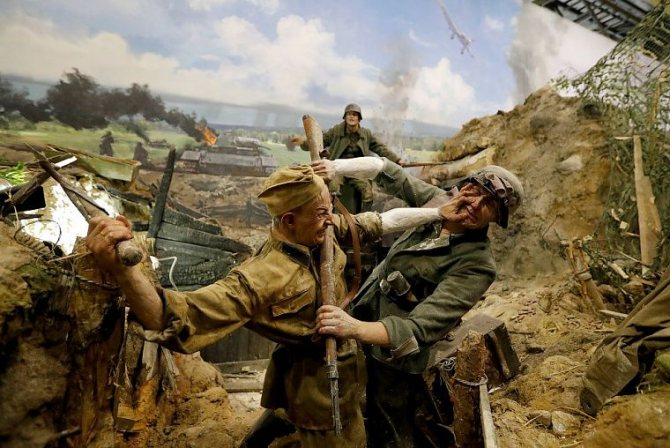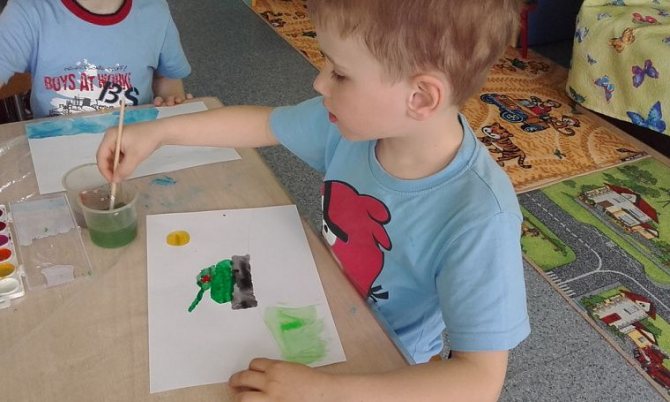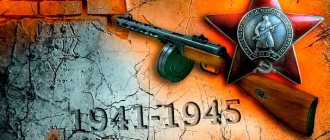Website “Mom can do anything!” I collected the most interesting poems for May 9 for preschoolers. On the eve of Victory Day, kindergartens hold concerts and meetings with veterans. These verses will be very helpful. Their children will be able to tell veterans and congratulate their great-grandparents. And with their help, adults will be able to tell children about the great Victory Day, why May 9 is so important for us.
Victory Day
I’ll sit on my grandfather’s lap and quietly whisper: “Tell me, dear grandfather, and I’ll keep quiet!” I will listen to everything you want to tell me, and I won’t turn around and interrupt! I want to hear about the war, how you fought, How you saved the banner in such a distant battle! Tell us about your military friends, your grandfather, and show them in a yellowed photo album! He smiled at his grandfather’s grandson and pressed it to his chest: “I’ll tell you about everything, of course, since I promised!” How we survived the war, how we walked to death, How many miles we traveled in mud and dust! We fought like an enemy from our native land and didn’t give an inch - we survived, we were able to! And now we celebrate Victory Day with you, only in a festive parade at the command: “Get into formation!”
(Natalia Maidanik)
***
How to tell your child about Victory Day
Children perceive any event through a certain visual sequence. They associate Victory Day, first of all, with fireworks, marches, displays of equipment and soldiers' porridge. For them, this is something like a matinee, when they rehearse a marching step together, and then, dressed up, they walk in a group or class down the street. The echoes of the Great Patriotic War echo back to us, but for our children this is already a kind of story about how their great-grandfather went against the Germans. On the one hand, it is a little sad, but on the other hand, it is great happiness that we know about the war only by hearsay.
Quick registration Get 5% discount on your first order! Unfortunately, due to the self-isolation regime, no one will march, which means that adults are faced with a new task: to explain to the younger generation what Victory Day is. We offer a few simple steps to help create a festive atmosphere at home.
Step #1.
Decorate the house
Find a time when both you and your child are not busy with anything else, and start decorating the house in honor of Victory Day. The All-Russian event “Windows of Victory” is currently underway: this is a wonderful opportunity to honor the memory of all soldiers and feel the mood of the holiday. Prepare templates in advance (the Internet provides a lot of options) and a soap solution to glue the figures to the glass. This activity can captivate you for the whole day, and you won’t get bored. If you have good artistic abilities, then use paints - the drawing will turn out bright and vibrant.
Step #2.
Talk about the Great Patriotic War
While you and your child are decorating the house, share what you know about the war and Victory Day. Your story should not be a dry report, like from the “Soviet Information Bureau”, but rather a story or even a fairy tale. If the children are very young, then you should not bombard them with complex words “German fascist invaders”, “occupation”, “blockade” - the simpler the better. The text could be like this:
“Do you know what holiday we are preparing for? Our entire huge country will celebrate Victory Day on May 9. This is a very big holiday. Once upon a time, when neither you, nor my dad and I, nor even my grandparents existed, a war began in our Motherland. It lasted a very long time: 4 summers, 4 autumns, 4 winters and 4 springs. The fascists (these are enemies) wanted to seize our lands. They sent us thousands of angry soldiers with guns shooting sharp bullets, hundreds of huge tanks and the same number of planes roaring like thunder in the rain. Our great-grandmothers and great-grandfathers did not want to give up and live according to the rules of the enemy. The entire huge country stood up to defend its borders. That’s why we say “The Great Patriotic War,” because everyone, everyone, everyone (both men and women) fought the Nazis. Great-grandfathers were brave warriors, and great-grandmothers were nurses and helped the wounded. And so, after 4 summers, 4 autumns, 4 winters and 4 springs, our soldiers won a victory and drove out the enemy. But many died in that war. In honor of the heroes who fought the Nazis, monuments were erected throughout our vast country. And every year, on May 9, we congratulate each other on victory in the Great Patriotic War. We remember our veterans - these are experienced soldiers who saved their Motherland. We remember and are proud of the warriors who fought without fear for all of us: for our grandparents, for our mothers and fathers, for our children and their future. On Victory Day, we always rejoice in the fact that for many years planes have not flown in the sky, roaring like thunder in the rain, and huge tanks have not been driving along the ground. And we say to our veterans: “Thank you for the peaceful sky above your heads!”
The story, of course, is adapted to the age of the children, and no one can cancel the parents’ imagination. You can use information from books or the Internet.

Step #3.
View photos
Looking through family albums will help you feel the holiday spirit. Tell the child about his ancestor, show photographs, letters from the front, awards, some personal items, if any have survived. Remember how you celebrated Victory Day as a child, share your emotions.
Step #4.
Go on an excursion
Of course, this is physically impossible now, but thanks to various resources you can take a virtual tour. For example, the popular website “My Family in the History of the Great Victory” offers tours of museums and exhibition halls and 3D panoramas of wartime in a virtual teaching room. The tour will be interesting not only for children, but also for adults.

Step #5.
Craft, draw, play
Children over 5 years old will definitely be interested in encyclopedias. Boys will be fascinated by books about military equipment, weapons, and military ranks. Look at the illustrations together, read the descriptions and characteristics of the combat vehicles. Offer to make a craft or drawing. As a rule, all boys can and love to draw tanks. The main thing is not to limit the flight of imagination. Let the child draw as he feels, even if you know that there were no laser guns in 1941.

Girls can be told about the heroism of nurses and doctors. If you have a doctor's set, this would be a great option for the game. Get dad involved, let him pretend to be a wounded soldier, and let his daughter become a caring nurse. For older preschoolers, set up a small field kitchen. This year we will have to limit ourselves to personal square meters, but it’s better than nothing. Cook soldier’s porridge with your children and make tea. To better feel the military spirit, try making a tent from sheets, chairs and scrap materials (maybe you have a ready-made one) and move your meals there. And if you also find iron utensils, it will turn out very atmospheric.
Step #6.
Organize a search for information
Nowadays you can find almost any information on the Internet. Set yourself the goal of collecting all kinds of data on your relatives who participated in the war. If you haven’t had the opportunity to arrange everything before, now is the time. Make a special album or carefully put documents in a folder, involve the children in this activity, let them decorate, for example, the cover with prepared stickers. This activity will be better than any board games. Along the way, you can talk about Victory Day; you will definitely remember some family stories.
Step #7.
Read literature
It’s better to read poetry with kids. If desired, learn a small and understandable piece of work.
12 poems about war for kids
- 1. S. Mikhalkov “No War” 2. T. Belozerov “Victory Day” 3. A. Usachev “What is Victory Day” 4. S. Pivovarov “Old Photo” 5. A. Surkov “The beauty that nature gives us » 6. A. Vladimirov “To Women Warriors” 7. V. Stepanov “A Veteran’s Story” 8. A. Barto “In the Days of War” 9. N. Tomilina “Victory Day” 10. A. Tvardovsky “A Tankman’s Story” 11. V. Stepanov “Friends Come to Grandfather” 12. P. Voronko “Victory Day”
If you have children over 5-6 years old, then choose a short story. After reading, be sure to ask your child what he liked about the work, which characters he remembered, what he felt and imagined. Thus, children will not only get a little touch on that distant time, but will also expand their vocabulary and develop coherent speech skills.
10 war stories for children
The most relevant and useful information for modern parents is in our newsletter. We already have over 30,000 subscribers!
- 1. S. Alekseev “Victory will be ours!” 2. A. Platonov “Little Soldier” 3. K. Paustovsky “Steel Ring” 4. S. Georgievskaya “Galina’s Mom” 5. V. Dragunsky “Watermelon Lane” 6. V. Oseeva “Andreyka” 7. G. Cherkashina “ Doll" 8. A. Mityaev "Bag of Oatmeal" 9. A. Gaidar "Hike" 10. G. Abrahamyan "An Incident at the Crossing"
Step #8.
Listen to songs of the war years
You can turn them on in the background when you decorate the house, make some crafts with your children, or paint. If the child is artistic, then learn one of your favorite songs together and record the performance on video. If you wish, you can take part in a military song competition. Or simply please your family and friends with your creativity.
Step #9.
Watch themed cartoons
Old Soviet cartoons and modern short films are freely available online. Choose the one you like and watch it together. First, watch the cartoon yourself and evaluate whether it is suitable for your child’s age. Afterwards, talk about the plot, offer to make a drawing for the cartoon.
10 cartoons about war for children
- 1. “A Soldier’s Tale” 2. “The Legend of the Old Lighthouse” 3. “Cornflower” 4. “Memory” 5. “Soldier’s Lamp” 6. “Fireworks” 7. “The Adventures of Red Ties” 8. “Strong in spirit are stronger than walls” 9. “Pioneer Violin” 10. “Live”
With younger students, watch a movie about wartime and patriotism.
15 films about war for children
- 1. “Son of the regiment” 2. “Sit down next to me, Mishka!” 3. “Four tankmen and a dog” 4. “A girl is looking for her father” 5. “Boys” 6. “Kingfisher” 7. “Oginsky’s Polonaise” 8. “Five Braves” 9. “A bullet is afraid of the brave, or Mishka takes the fight” 10 "Alexander Little" 11. "Vasyok Trubachev and his comrades", "Trubachev's detachment is fighting" 12. "The Tale of Malchish-Kibalchish" 13. "Officers" 14. "Once upon a time there was a girl" 15. "Soldier"
Step #10.
Arrange a holiday
Self-isolation is not a reason to wear pajamas all day, especially on Victory Day. Dress in smart clothes, don’t forget about the St. George’s Ribbons, and prepare a festive lunch. Call your family to congratulate them. If possible, buy or sew front-line clothing for the children in advance and arrange a themed photo shoot. Select several photos and design them using simple postcard editors. It might even become a tradition for your family. Watch a recording of last year's parade and fireworks on Red Square. Such holiday symbols are very important for children.
At the end of the evening, be sure to talk to your child about everything you did. Consider whether it is dangerous to be a soldier, what war is, why we celebrate May 9, and remind us once again how important it is to honor the memory of soldiers.
Quick registration Get 5% discount on your first order!
How do you celebrate Victory Day in your family? Share this or other family traditions in our group “Become a Lucky Child Blog Author!”
Discussion about the holiday
For my family, May 9 is a special day and a special holiday. I had two grandfathers in my family, and they were both veterans of the Great Patriotic War.
On my father's side, my grandfather came back from the war with the rank of major. He began his military service even before the Great Patriotic War, in the Soviet-Finnish war. At first he was in the active army as a sniper. The war in Finland had its own peculiarities. This country was an ally of Nazi Germany. Many snipers fought against our military. Our soldiers encountered them for the first time. We suffered heavy losses, and the command decided to urgently train snipers. Since my grandfather already had experience as a sniper, he was sent to train future snipers. The fighting took place in winter. It was necessary to move quickly on skis, and at the same time shoot and defend. Therefore, my grandfather, in addition to teaching soldiers to shoot, also taught them to ski.
Grandfather tried to teach young soldiers everything that he could do. It depended on how he prepared the soldier whether he would return alive from the battle or not. Grandfather tried his best. After the war, the command awarded him the medal “For Military Merit.” He trained a very large number of soldiers. He has a certificate of gratitude from the command.
After the war, my grandfather left the army to work as a trainer. He was invited to become a biathlon coach. And until his retirement, he was the coach of the country's biathlon team.
My second maternal grandfather retired from the army with the rank of colonel. He gave 50 years to the army.
He went to the front without finishing 10th grade. I credited myself with an extra year. In fact, he was only 15 years old.
When he, along with other recruits, was gathered near Lipetsk at the railway station, German planes bombed the station 2 times. After that, he decided that he would become an anti-aircraft gunner.
Grandfather did not like to talk about the war. Whenever he was invited to my school, he always refused.
My grandfather has a medal “For Courage”. When I asked him to tell me why he received it, he told me. His platoon had gone far ahead of its regiment. The soldiers were left without food. To help out his comrades, he stole a military field kitchen from the Germans. The commander laughed for a long time at my grandfather’s action. For this he was nominated for his first award. In total, my grandfather had 3 orders and 38 medals.
Every year, when May 9 comes, I, along with my family, take part in the Immortal Regiment parade. I proudly carry portraits of my grandfathers!










